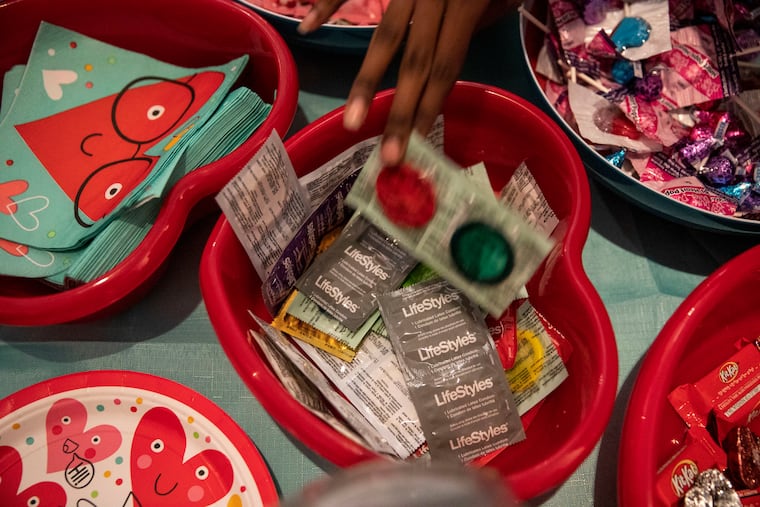Just in time for Valentine’s Day, teens get lessons on STDs and relationships at Philly’s Mütter Museum
The event, cheekily named “Condoms and Candies,” is part of the Mütter’s Teen Health Week, a statewide initiative to raise awareness of health issues like vaccines, mental health, substance use and sexual development.

Three days before Valentine’s Day, 65 teens gathered at one of the less romantic spots in town — the Mütter Museum of the College of Physicians of Philadelphia — to learn about safe sex and healthy relationships, and get tested for HIV.
Bowls filled with colorful condoms sat next to dishes overflowing with lollipops and packs of M&M’s. Educators from Planned Parenthood and the AIDS Healthcare Foundation gave brief presentations.
At the end of the event, pairs of teens competed in a Jeopardy!-style tournament to answer trivia questions about sexually transmitted diseases, abusive behaviors in relationships and the hormones that drive puberty.
“It’s not dysentery?," one teen asked his friend after they failed to come up with the medical term for menstrual cramps — dysmenorrhea.
The event, cheekily named “Condoms and Candies,” is part of the Mütter’s annual Teen Health Week, a statewide initiative to raise teens’ awareness of vaccines, mental health, substance use, and sexual development. The four-year-old initiative has expanded to include Alabama, North Carolina, Virginia, Illinois, and California, with events held all year long. (The bulk of this year’s Teen Health Week will take place from April 6 to 12 at the Mütter.)
The students at the Mütter on Tuesday participate in the museum’s educational programs for teens interested in pursuing careers in healthcare. The programs started a decade ago after staff noticed how fascinated high school students were by the museum’s famous exhibits of medical oddities and other marvels, said Jacqui Bowman, director of education at the College of Physicians of Philadelphia.
“This is a place where teenagers want to come to because it’s not a clinical space, it’s not a medical space, it’s just a place of history and learning,” Bowman said. “They become very comfortable being here and get to know the staff very well.... We start to see the challenges they’re facing and things they wish they knew.”
The museum focuses on youths from low-income backgrounds, teens affected by violence, LGBTQ youth, and girls from Africa or the African diaspora.
Sex education is particularly important in Philadelphia, where syphilis occurs at more than twice the national rate at 26 cases per 100,000 people in 2018. The city’s gonorrhea and chlamydia rates also exceeded national averages, and the opioid epidemic has driven up the number of new HIV cases in Philadelphia.
Pennsylvania does not require schools to provide sex education. (State Rep. Brian Sims introduced a bill in June to change that.) School districts may choose their own sex education curriculums, which often stress abstinence rather than providing information for teens about sex and relationships.
“A lot of the stuff we’re talking about here is stuff that schools are supposed to teach, but because of constraints with teachers and curriculums, they’re not able,” said Anjali John, an 18-year-old student at Masterman High School. “Abstinence-only sex education is not always productive and doesn’t actually help teens.”
Kyle Brown, a 19-year-old student at Roman Catholic High School, said that he’s concerned about how many of his peers don’t practice safe sex because they think that “nothing can happen to them.”
“I feel like we really have to raise awareness for people, open their eyes and be like, ‘This could happen, you have to be safe out there,’” he said. “Even if it was a random person, I would tell them this information because if you let someone walk around with false information, it could really harm them in the future.”
A relatively new challenge is helping teens learn how to sort through misinformation they might find online, said Sarah Lumbo, teen health programs coordinator at the College of Physicians of Philadelphia.
“This space gives them exposure to all the different resources they can go to to learn more, so they can go online and learn how to understand what is fact and what is not,” she said. “It also allows them to have their first experience getting tested be in a space that’s familiar to them, where they’re not going to be judged.”
Museum leaders hope these teens will take their knowledge back to their schools and talk about health with their peers. Masterman’s John said that before joining one of the museum’s teen programs, she “would never tell someone how to have safe sex or about an STD.”
“But now I’m more educated and more willing to talk about it,” John said. “For teens, it’s not always fun to listen to adults, but if other teens tell you the information, you’re more receptive to the information.”